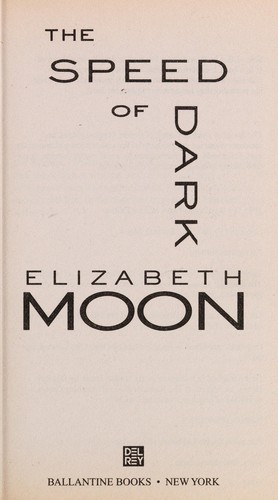Thom reviewed The speed of dark by Elizabeth Moon
Review of 'The Speed of Dark' on 'Goodreads'
2 stars
Elizabeth Moon's novel The Speed of Dark won a Nebula award, and was nominated for the Clarke and Locus SF awards. In my opinion, this novel didn't reach those heights.
Most of the novel is told from the perspective of the main character, Lou Arrendale. In this future earth, autism is cured at birth, but Lou is from a generation that missed out on that cure. He and several other autistic adults work for an unnamed company, putting their pattern recognition skills to good use - Lou's highly functioning group of is the most profitable in the company. In his spare time, he participates in a fencing group and within the novel attends his first tournament. Here also, pattern recognition provides a great boon.
A pair of conflicts in the novel stem from his new boss (a cost-cutting and short-sighted ladder climber) and a member of his fencing group. Interesting is the way that Lou mostly recognizes the first threat but not the second, assuming the motives are good because of the professed friendship. Another conflict shown is Lou versus "normal" society, dealing with airport security personnel or service station employees.
Elizabeth Moon's own son is autistic, and both her descriptions and Lou's point of view are lovingly crafted. Much of the "science fiction" here likely comes as a wish for a better world for her son and autistic persons everywhere. While reading this book, I also finished Malcom Gladwell's David and Goliath. In that book, he talks of the success of some dyslexics, and Moon's subjects show similar success. I very much enjoyed this aspect of the novel. I have no doubt that a lot of the brain science described is also very accurate.
Unfortunately, the rest of the SF in this story just doesn't hang together. There is a mentioned "space program" and the medical procedures that make up the main story point, but that's about it. The rest of the world felt dated, as if it were still 2003.
The author jumps out of character when she wants to show something behind the scenes. These episodes are sporadic and jarring; it would have been better to use a second character (involved in each of the incidents) or perhaps have Lou find out about them later.
The ending of the novel felt very sudden. After hundreds of pages describing Lou's thoughts in detail, the story drops to just a few. It feels as if a diary were no longer kept. Perhaps that was the intention, but I would have preferred more closure. Does the son of Lou's supervisor take the treatment? Does Lou continue to fence, and is his skill affected there or at work?
While I enjoyed the success of Lou at work and in hobbies, the rest of the novel just didn't work for me - it was just okay, the equivalent of one and a half stars out of five.

